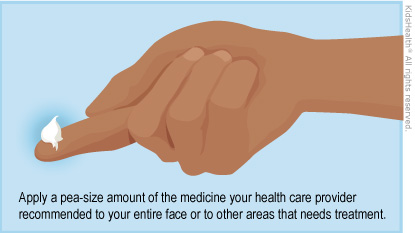How to Help Your Acne Get Better
Acne medicines can help your acne improve. It might take 8–12 weeks before you start to see an improvement. For best results, follow the directions carefully.
If you have been using an over-the-counter (nonprescription) acne wash, stop using it. Over-the-counter cleansing products are too drying to continue using along with the medicines your health care provider prescribed.


When you begin your acne treatment, start it at night.
Nighttime Routine
-
Wash your face with gentle soap and water. For example, Dove® soap (use a bar, not liquid) or a gentle liquid soap (such as Neutrogena® or Cetaphil®).
-
Pat dry.
-
After 10–15 minutes, apply a pea-size amount of the medicine your health care provider recommended to your entire face. This could be benzoyl peroxide or tretinoin. This is enough to spread a thin layer from your hairline to your chin. Don't put it close to your eyes or on your lips. If you have acne in other areas, also use a pea-size amount for each large area you will treat. For example, use a pea-size amount on the chest, back, or shoulders. Use a smaller amount on smaller areas, such as the ears.
-
Wash your hands well.
If your health care provider gave you two medicines, alternate them nightly (use one medicine one night and the other the next night). This will prevent your skin from getting too dry or irritated. If dryness or irritation happen, use a moisturizer in the morning.
When the health care provider says it's OK, treat your acne like this:
Morning Routine (benzoyl peroxide only)
-
Get dressed first to avoid getting the medicine on your clothes.
-
Wash your face as described above.
-
Pat dry.
-
After 10–15 minutes, apply the benzoyl peroxide gel to your face as described above.
-
If your skin is dry, use moisturizer.
-
Wash your hands well.
Nighttime Routine
-
Wash your face as described above.
-
Pat dry.
-
After 10–15 minutes, apply the retinoid medicine (for example, tretinoin, or Epiduo®, which is a combination of adapalene and benzoyl peroxide) to your face and other parts of the body, if your doctor instructed you to do so. This medicine should only be used in the evening because it does not work well if exposed to sunlight.
-
If your skin is very dry, wait a few minutes and then apply moisturizer.
-
Wash your hands well.
Tips for Sensitive Skin
If you have sensitive skin, start using any new skin medicine gradually:
-
Week 1: Use it every third day.
-
Week 2: Use it every other day.
-
Week 3 and after: Use it as prescribed if it causes no side effects.
Watch for Possible Side Effects
Acne medicines can cause side effects such as irritation, dryness and redness. If any of these happen, you can:
-
Wait about 30 minutes after washing your face before applying the medicine.
-
Apply the medicine every other night until tolerated, then begin to apply it every night.
-
Apply a smaller amount of medicine. The medicine should soak in or be absorbed quickly into your skin. If you have a white film on your face, you are applying too much.
-
Use moisturizer as needed.
Fabric Bleaching Caution
Products with benzoyl peroxide do not bleach skin. But they can bleach fabric, such as sheets, towels and clothes.
Here are some tips that can help:
-
Sleep on light-colored sheets so bleach stains won't be as noticeable.
-
If you put the medicine on your chest or back, keep in mind that what you wear to bed can be bleached if you sweat during sleep.
-
Always wash your hands well after applying medicine, morning or night.
Shopping for Skin Care Products
If you use cleanser, moisturizer, sunscreen or makeup on your face, read the product labels. Look for products that say they are: